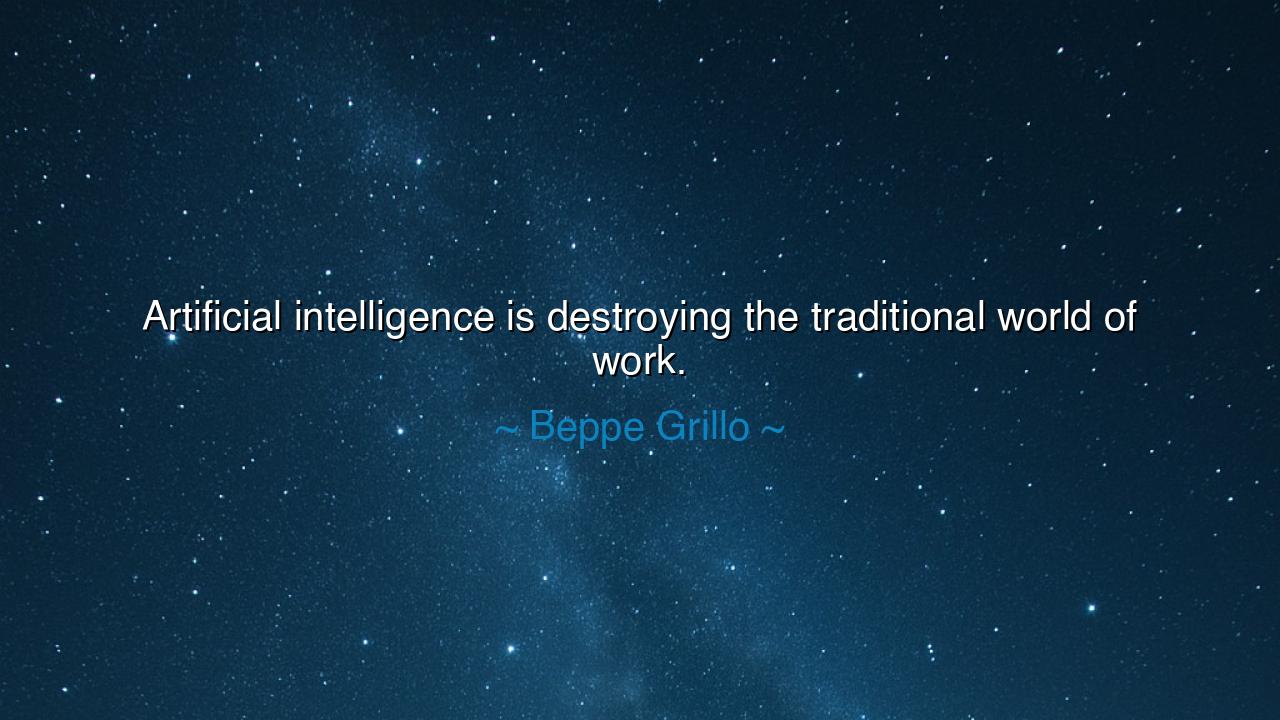
Artificial intelligence is destroying the traditional world of






In the stark and prophetic words of Beppe Grillo, the Italian comedian-turned-political visionary, echoes a truth that shakes the pillars of the modern age: “Artificial intelligence is destroying the traditional world of work.” His declaration is not a cry of despair, but a warning born of awakening — a realization that humankind, in its relentless pursuit of progress, is tearing apart the very fabric that once gave it purpose and dignity. This quote stands as a torch in the dark halls of our new digital empire, illuminating the cost of our inventions and calling us to reconsider what it means to work, to create, and to belong.
The origin of this quote arises from Grillo’s lifelong confrontation with systems of power, technology, and society. As a founder of Italy’s Five Star Movement, he was both a jester and a prophet — a man who saw the machinery of civilization shifting before others dared to speak of it. When he spoke these words, artificial intelligence had already begun to reshape the global order: algorithms writing music, machines building machines, and automation replacing millions of hands that once built the world. To Grillo, this was not progress alone — it was a transformation of human identity. For what is man without work? What becomes of the craftsman when the tool learns to think, or the thinker when the machine begins to dream?
To say that AI is destroying the traditional world of work is not merely to lament the loss of jobs, but to mourn the erosion of something far deeper — the sacred relationship between effort and meaning. For thousands of years, labor was not just survival; it was art, service, and pride. The farmer communed with the earth, the smith shaped the soul of metal, and the scholar sought wisdom in words and silence. In their toil, people found not only bread, but identity. Yet now, as machines take up the burden of creation, humanity stands idle — richer in possessions, poorer in purpose. Grillo’s warning reminds us that progress without reflection can make gods of our tools and beggars of our souls.
We have seen this pattern before. During the Industrial Revolution, steam and steel transformed the world — but at a terrible cost. The weavers of England lost their looms to machines, the artisans of Europe saw their crafts reduced to factory lines. The poet William Blake called those factories “dark satanic mills,” for he saw in them not the triumph of progress, but the death of imagination. And yet, humanity endured — it learned to adapt, to find new forms of value in the wake of its own upheaval. So too, in this new revolution of artificial intelligence, we stand again on the precipice — not of extinction, but of transformation.
But Grillo’s words bear a deeper wisdom: that technology is not our enemy, but our mirror. AI does not destroy; it reveals. It exposes what we have built — systems that value efficiency over empathy, speed over soul, profit over person. It is not the machine that has robbed the worker of meaning, but the civilization that has forgotten to honor the worker. The machine only follows the commands of its maker — and if those commands are blind to humanity, the fault is not in the code, but in the heart of man. Thus, Grillo’s lament is also a challenge: to restore the moral foundation of our inventions, to let intelligence — human or artificial — serve life, not replace it.
We must remember that work, in its truest sense, is not only production — it is participation in the act of creation. Even as machines rise to take on physical and mental labor, the soul of humanity must turn toward new frontiers: compassion, imagination, connection, and wisdom. These are the realms where no algorithm can tread. The future will belong not to those who compete with machines, but to those who learn to collaborate with them — guiding their intelligence with conscience, and their speed with purpose.
So, my child, take heed of Grillo’s warning, but do not tremble before it. The world of old labor may be dying, but something greater can yet be born. Do not seek only to preserve what was, but to reimagine what can be. Let your intelligence be joined with heart, your innovation tempered by ethics, your ambition guided by wisdom. For machines may calculate, but only humans can care. The age of AI need not be the end of meaning — if we choose, it can become the beginning of a new harmony between creation and consciousness.
For as Beppe Grillo warns and the ancients would agree, when man forgets his role as steward of his own destiny, his inventions become his masters. But when he remembers — when he weds power with virtue — even the cold logic of a machine can serve the warmth of the human spirit. The question is not whether AI will destroy the old world of work, but whether we will have the courage to build a new world of purpose in its place.






AAdministratorAdministrator
Welcome, honored guests. Please leave a comment, we will respond soon